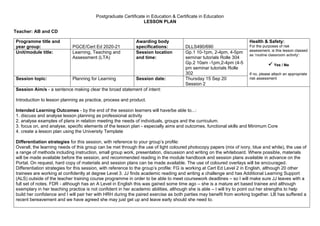This document contains a lesson plan for a postgraduate certificate in education course. The plan is for a session on lesson planning and includes details like the session aims, intended learning outcomes, differentiation strategies, and a timeline of content and activities. The plan discusses introducing lesson planning concepts, analyzing examples, and having students create their own lesson plan. Formative assessment of student understanding and progress is mentioned. At the end, there is a section for evaluating the session's impact on student learning and development.





